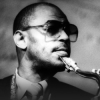Archie Shepp

Archie Shepp
Archie Sheppis an American jazz saxophonist. Shepp is best known for his passionately Afrocentric music of the late 1960s, which focused on highlighting the injustices faced by African Americans, as well as for his work with the New York Contemporary Five, Horace Parlan, and his collaborations with his "New Thing" contemporaries, most notably Cecil Taylor and John Coltrane...
NationalityAmerican
ProfessionSaxophonist
Date of Birth24 May 1937
CountryUnited States of America
ideas guy rebel
So, I was just a young guy, maybe with an idea, and Cecil Taylor, himself a rebel, would take a chance on a guy like me. It turned out to be a very symbiotic partnership. I learned a lot from him.
play numbers people
To some degree, yeah, because I have to play a certain number of originals that might be considered avant-garde material. I realize though, that only a few people in the audience actually know what that music is, or understand it.
father kids race
I can't see any separation between my music and my life. I play pretty much race music: its about what happened to my father, to me, and what can happen to my kids.
musical identity transformation
And when I met Cecil Taylor it was a complete transformation of musical identities. All the tenets that I had grown up with were thrown out the window.
strong rap elements
In rap music, even though the element of poetry is very strong, so is the element of the drum, the implication of the dance. Without the beat, its commercial value would certainly be more tenuous.
rights interesting political
It was a particularly interesting and exciting time, and the European political and artistic establishment was turned on by the Civil Rights Movement and the artistic revolution that was becoming a part of jazz.
rap roots long
Rap actually took root in the Negro community, and then in the Hispanic community, long before it impacted on the larger American community as a whole.
rap black-youth white
So, rap has that quality, for youth anyway; it's a kind of blues element. It's physical, almost gymnastic. It speaks to you organically. Rap grows out of what young people really are today, not only black youth, but white - everybody.
important elements response
Yes, the audience is so important to Negro music, especially the element of call and response.
views states knowledgeable
I find that here in the States, audiences are generally less knowledgeable, from the cognitive point of view, though they are emotionally more receptive.
generations young involved
A whole generation of young whites have involved themselves with traditional Negro music.
culture jazz existential
Music and culture are intrinsically improvisational, existential.
beer black bars
Black music has become a commercial commodity. Live performances are not so accessible as they were previously. It use to be possible to go to the bar on the corner and hear music. It was available for a fifteen cent beer.
window thrown
All the tenets that I had grown up with were thrown out the window.